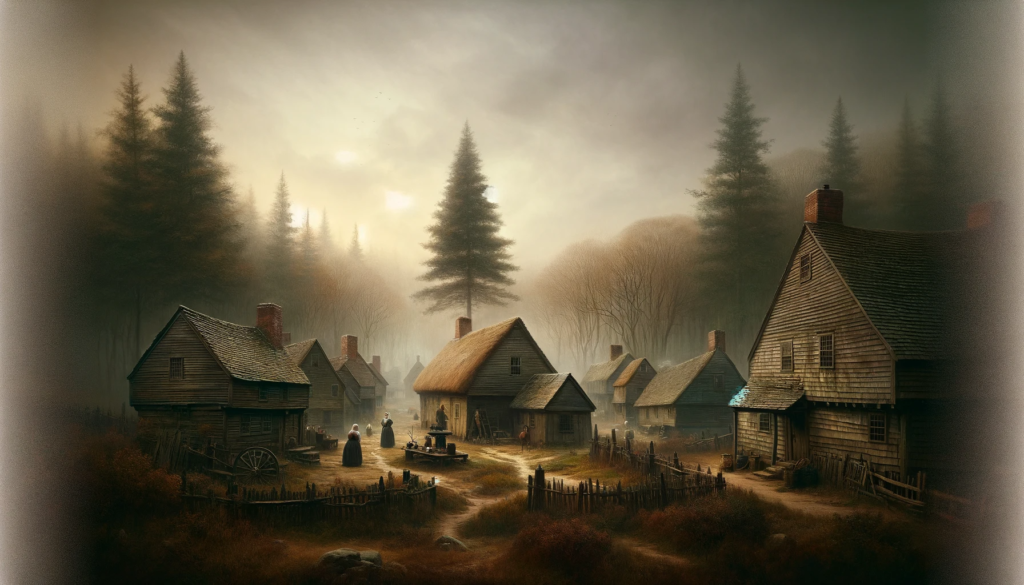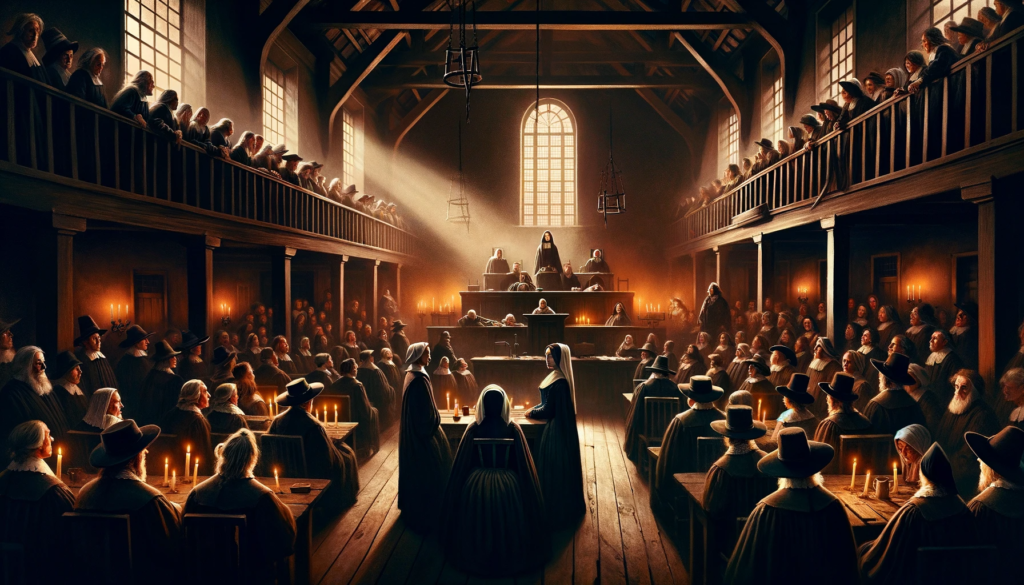In the late 17th century, a series of events unfolded in the small Puritan community of Salem Village, Massachusetts, which would later be etched in the annals of American history as the Salem Witch Trials. This dark period, characterized by fear, superstition, and a fervent quest for justice, offers a unique lens through which to examine the complexities of human nature, governance, and the legal system in colonial America. As we delve into the Salem Witch Trials, we aim to uncover the societal and religious underpinnings that fueled this hysteria, the impact it had on the community, and the critical lessons learned in the pursuit of fairness and justice. This exploration is particularly relevant in today’s context, shedding light on the dangers of mass hysteria and the paramount importance of due process—a cornerstone of American ideology that champions individual liberty and the limitation of government power.

Societal and Religious Factors Fueling the Witch Trials
The late 1600s were a time of great uncertainty and strife in the New England colonies. Salem Village, in particular, was a microcosm of the larger pressures facing the Puritan communities—land disputes, neighborly disputes, and the constant threat of attack from Native American tribes. Within this volatile environment, the Puritans’ deeply held belief in the supernatural and the devil’s active presence in their daily lives created a fertile ground for the spread of witchcraft accusations.
Religious fervor played a central role in the life of the Puritans. Their strict adherence to the Bible and the belief in predestination created a societal framework that was intolerant of deviation. This rigidity, combined with the stresses of colonial life, led to an atmosphere where accusations of witchcraft could easily flourish. The witch trials were, in part, a manifestation of the community’s attempt to purge itself of perceived evil and maintain social order.
Impact on the Community and Lessons Learned
The witch trials had a profound and lasting impact on Salem Village and the broader community. More than 200 individuals were accused of witchcraft, with 20 ultimately being executed. Families were torn apart, and the social fabric of the community was irreparably damaged. The trials showcased the dangers of unchecked governmental power and the consequences of a justice system that lacks safeguards for the accused.
From this tragic period, several key lessons emerge. The Salem Witch Trials highlight the critical need for due process and the protection of individual rights within the legal system. They serve as a cautionary tale about the dangers of mass hysteria and the importance of critical thinking and skepticism in the face of accusations. Furthermore, they underline the detrimental effects of allowing fear and superstition to guide decision-making processes, especially within the context of governance.

The Dangers of Mass Hysteria and the Importance of Due Process
The Salem Witch Trials reveal the catastrophic outcomes when fear overrides logic and fairness. Mass hysteria, fueled by unfounded accusations and amplified by communal anxieties, led to a breakdown of rationality and justice. This phenomenon is not unique to Salem; history is replete with instances where fear and hysteria have overridden the principles of justice and due process, often to the detriment of the innocent.
The importance of due process, a concept enshrined in the American Constitution, cannot be overstated. It serves as a bulwark against the tyranny of the majority and the misuse of government power. The trials underscore the necessity of a legal system that upholds the rights of the individual, ensures fair and impartial proceedings, and guards against the excesses of governmental authority.
Unraveling Truths and Misconceptions
As we revisit the Salem Witch Trials, it is crucial to separate fact from fiction. Misconceptions about the trials abound, often overshadowing the real human experiences and the lessons they impart. By examining the historical records, testimonies, and legal documents from the period, we gain a clearer understanding of the events and their significance in the context of American legal and cultural history.
The trials serve as a reminder of the dark consequences of allowing fear, superstition, and unchecked power to dictate justice. They also highlight the resilience of the human spirit and the capacity for society to reflect, learn, and evolve. As we reflect on this period, we are reminded of the enduring values of fairness, due process, and the limitation of government power—principles that continue to guide and shape the American legal system and its democratic ideals.
Conclusion
The Salem Witch Trials stand as a poignant example of the dangers posed by mass hysteria, the absence of due process, and the unchecked exercise of governmental power. By examining this period through the lens of contemporary values and ideals, we gain valuable insights into the importance of safeguarding individual liberties, maintaining a fair and just legal system, and limiting governmental authority to prevent the recurrence of such injustices. As we navigate the challenges of the 21st century, the lessons of Salem remain ever relevant, reminding us of the need to uphold the principles of fairness, justice, and the protection of individual rights at the heart of the American experience.
Posts
- Exploring the Rich Tapestry of American History, Culture, and Trivia (15 December 2023)
- Welcome to American Facts 101: Your Ultimate Source for Exploring American History, Culture, and Trivia (15 December 2023)
- Uncovering the Hidden Gems of the USA (15 December 2023)
- Uncovering the Untold Stories of the USA (15 December 2023)
- Exploring the Rich Tapestry of American History and Culture (15 December 2023)
- Revealing America’s Saga: The Untold Chronicles of a Nation (15 December 2023)
- Charles Carroll: The Wealthiest Revolutionary and Fearless Freedom Advocate (15 December 2023)
- Revealing The Bill of Rights: Fortifying Our Precious Liberties! (22 December 2023)
- Benjamin Franklin Exposed: Maverick Creator, Shrewd Diplomat, Timeless Visionary (22 December 2023)
- Revealing Alexander Hamilton: The Visionary Maverick Who Sculpted America’s Future (28 December 2023)
- Jefferson’s America: How a Founding Father Forged a Nation’s Destiny (30 December 2023)
- Father of the Nation: How John Adams Shaped America’s Destiny (1 January 2024)
- Forgotten Trailblazers: Revealing the Covert Champions of the Revolution (3 January 2024)
- America’s Gilded Epoch: A Tale of Swift and Monumental Change (5 January 2024)
- Unveiling the Declaration: A Beacon of Liberty and Hope (6 January 2024)
- The Great Depression: Resilience in the Face of Adversity (11 January 2024)
- Revolutionizing Brilliance: The Daring Leap of America’s Industrial Breakthrough (14 January 2024)
- Navigating the Rugged Terrain of Civil Rights Victory (18 January 2024)
- A Decade of Revolutionary Transformation and Lavish Exuberance (19 January 2024)
- Space Odyssey: America’s Bold Soar into the Celestial Frontier (21 January 2024)
- The Oregon Trail: Pioneers and Perils of the Westward Expansion (26 January 2024)
- The Louisiana Purchase: A Colossal Expansion of America’s Realm (27 January 2024)
- The Profound Influence of Immigration on the USA (28 January 2024)
- The Gold Rush: Dreams and Hardships in the West (9 February 2024)
- The Forbidden Decade: America’s Fervent Quest for Virtue (28 February 2024)
- Swinging Rhythms, Daring Flappers: A New Vision of the American Dream (1 March 2024)
- The Salem Witch Trials: Dread and Justice in Early American Colonies (3 March 2024)
- The Echoes of Liberty – Unveiling Federalist No. 1 (23 March 2024)
- Edward Rutledge: A Vanguard Spirit of Liberty’s Dawn (23 March 2024)
- John Jay: Pioneering Crusader for American Justice (29 March 2024)
- Revolt & Reason: The Untold Power of ‘Cato 1 (1 April 2024)
- Hidden Virtues: George Washington’s Secret Acts of Kindness (9 April 2024)
- How Jefferson’s Love for Meteorology Shaped the White House (9 April 2024)
- Echoes of the Night: Secrets of Navajo Skinwalkers Unveiled (10 April 2024)
- Ghost Ships of the Great Lakes (10 April 2024)
- Lincoln’s Grit: Unveiling the Wrestler-President (11 April 2024)
- Unity or Peril? The Covert Threat of Foreign Interference (14 April 2024)
- Roosevelt’s Midnight Quest: Secrets at the Smithsonian (14 April 2024)
- Revolutionary Ripples: Adams’ Potomac Epiphanies (14 April 2024)
- Washington’s Ale of Liberty: A Pioneering Patriotic Brew (14 April 2024)
- Visionary Rebellion: The Architect of U.S. Freedom (20 April 2024)
- Revealing the Legacy: The Enigma of Anti-Federalist Ideals (21 June 2024)
Categories
Tags
- Bill of Rights
- American history
- governance
- John Adams
- Founding Fathers
- American Revolution
- unsung heroes
- independence
- Great Depression
- resilience
- Gilded Age
- social changes
- Declaration of Independence
- American culture
- national identity
- economic hardship
- American Industrial Revolution
- technological advancements
- key inventions
- industrial growth
- Civil Rights Movement
- racial discrimination
- equality
- 1920s
- Roaring Twenties
- economic boom
- Space Race
- United States
- Soviet Union
- Oregon Trail
- westward expansion
- Louisiana Purchase
- immigration
- diverse cultures
- Gold Rush
- American West
- mining towns
